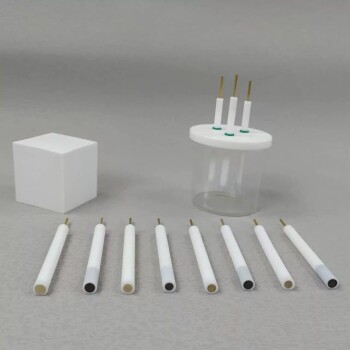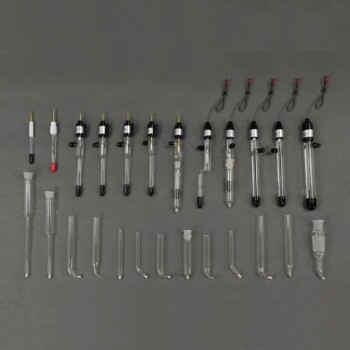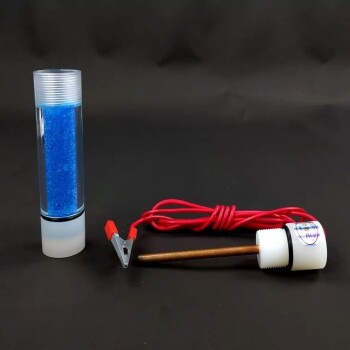The decision to dedicate a gold plate electrode to a single user or purpose is driven by one primary factor: the need to eliminate any risk of cross-contamination. In applications with stringent hygienic requirements, such as the biomedical and clinical fields, dedicating an electrode is not merely a best practice but a critical safety protocol to prevent the transmission of infections and ensure the integrity of the collected data.
While appearing to be a simple matter of cleanliness, dedicating a gold plate electrode is a fundamental requirement in sensitive applications to guarantee both patient safety and the absolute accuracy of a measurement. It is the most reliable way to prevent contamination from compromising both health and data.
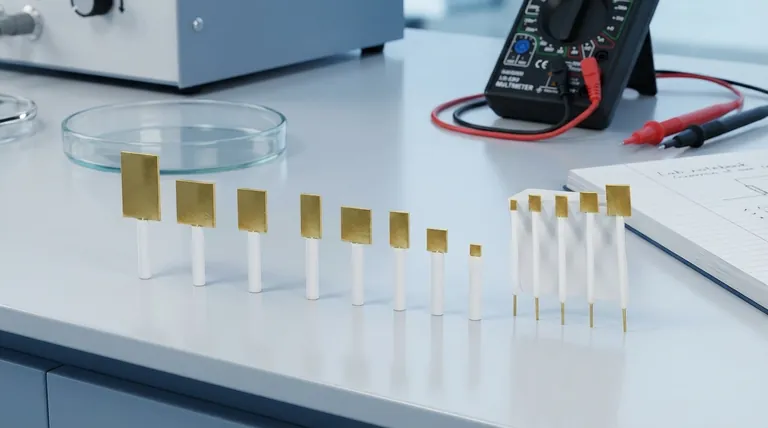
The Primary Driver: Preventing Cross-Contamination
When an electrode comes into contact with biological material, it can harbor microorganisms and organic residues. Dedicating the electrode is the most effective strategy to mitigate the associated risks.
Biomedical and Clinical Applications
In any medical or clinical setting, electrodes often make direct contact with a patient's skin or may be used in environments where bodily fluids are present.
Using an electrode on multiple users in this context creates a direct vector for transmitting bacteria, viruses, and other pathogens, posing a significant risk of infection.
Food and Pharmaceutical Processing
In quality control for food or pharmaceutical manufacturing, trace amounts of contaminants can ruin entire batches.
Dedicating electrodes for specific substances or testing stages prevents cross-contamination that could lead to inaccurate readings or spoiled products.
Beyond Hygiene: Ensuring Data Integrity
Contamination doesn't just present a biological hazard; it also fundamentally compromises the electrode's ability to perform its function accurately. The unique properties of gold that make it desirable are easily undermined by foreign material.
Impact on Electrical Impedance
The primary function of an electrode is to create a clean electrical interface. A microscopic layer of oil, protein, or other residue—known as a biofilm—can form on the surface.
This unseen layer alters the impedance of the electrode, introducing noise, drift, and artifacts into your measurements. This can render data from sensitive instruments like EEG or ECG completely unreliable.
Preventing Chemical Reactions
Gold is valued for its inertness, meaning it resists chemical reactions. However, residues left from one application can react with substances in a subsequent application.
This can corrode the delicate gold plating or, worse, create unintended chemical byproducts that skew experimental results.
Understanding the Trade-offs
While dedication is critical in many scenarios, it's essential to recognize it is a strategic choice with clear consequences. Not every application requires this level of control.
Increased Cost and Logistics
The most apparent trade-off is financial. Dedicating electrodes to a single user, especially if they are disposable, significantly increases operational costs compared to reusable, cleanable alternatives. This also adds logistical overhead for inventory and waste management.
The Limits of Sterilization
The alternative to dedication is a rigorous cleaning and sterilization protocol. However, this is often a flawed solution for gold plate electrodes.
Harsh chemical sterilants or autoclaving (high heat and pressure) can damage the thin gold plating over time, degrading performance and eventually causing the electrode to fail. Furthermore, proving complete sterilization of microscopic crevices is difficult and often impractical.
Making the Right Choice for Your Application
The decision to dedicate an electrode should be based on a clear-eyed assessment of the risks and requirements of your specific goal.
- If your primary focus is medical diagnosis or patient monitoring: Single-user dedication is non-negotiable to ensure patient safety and comply with regulatory standards.
- If your primary focus is high-sensitivity scientific research: Dedication per experiment or sample is crucial to prevent contamination that could create misleading artifacts and invalidate your results.
- If your primary focus is low-sensitivity prototyping or educational use (non-biological): Reusing electrodes with a standard cleaning procedure may be acceptable, as the risks of minor contamination are low.
Ultimately, dedicating a gold plate electrode is a deliberate choice to prioritize safety and accuracy above all else.
Summary Table:
| Scenario | Why Dedicate? | Key Risk Mitigated |
|---|---|---|
| Biomedical/Clinical Use | Prevent pathogen transmission | Patient infection, data inaccuracy |
| Food/Pharmaceutical QC | Avoid batch contamination | Spoiled products, false readings |
| High-Sensitivity Research | Eliminate measurement artifacts | Compromised data integrity |
| Low-Sensitivity/Educational Use | Optional (standard cleaning may suffice) | Minor contamination |
Ensure the highest standards of safety and accuracy in your lab.
When your work involves sensitive biomedical, clinical, or research applications, the risk of cross-contamination is too great to ignore. Dedicating a gold plate electrode is a critical step in protecting both patient health and the integrity of your data.
KINTEK specializes in providing reliable lab equipment and consumables, including high-quality gold plate electrodes designed for precision and durability. Whether you need dedicated electrodes for single-use protocols or advice on the best practices for your specific application, our experts are here to help you maintain uncompromising quality control.
Contact us today to discuss your laboratory needs and ensure your processes meet the highest safety and accuracy standards. Reach out via our contact form for a personalized consultation.
Visual Guide
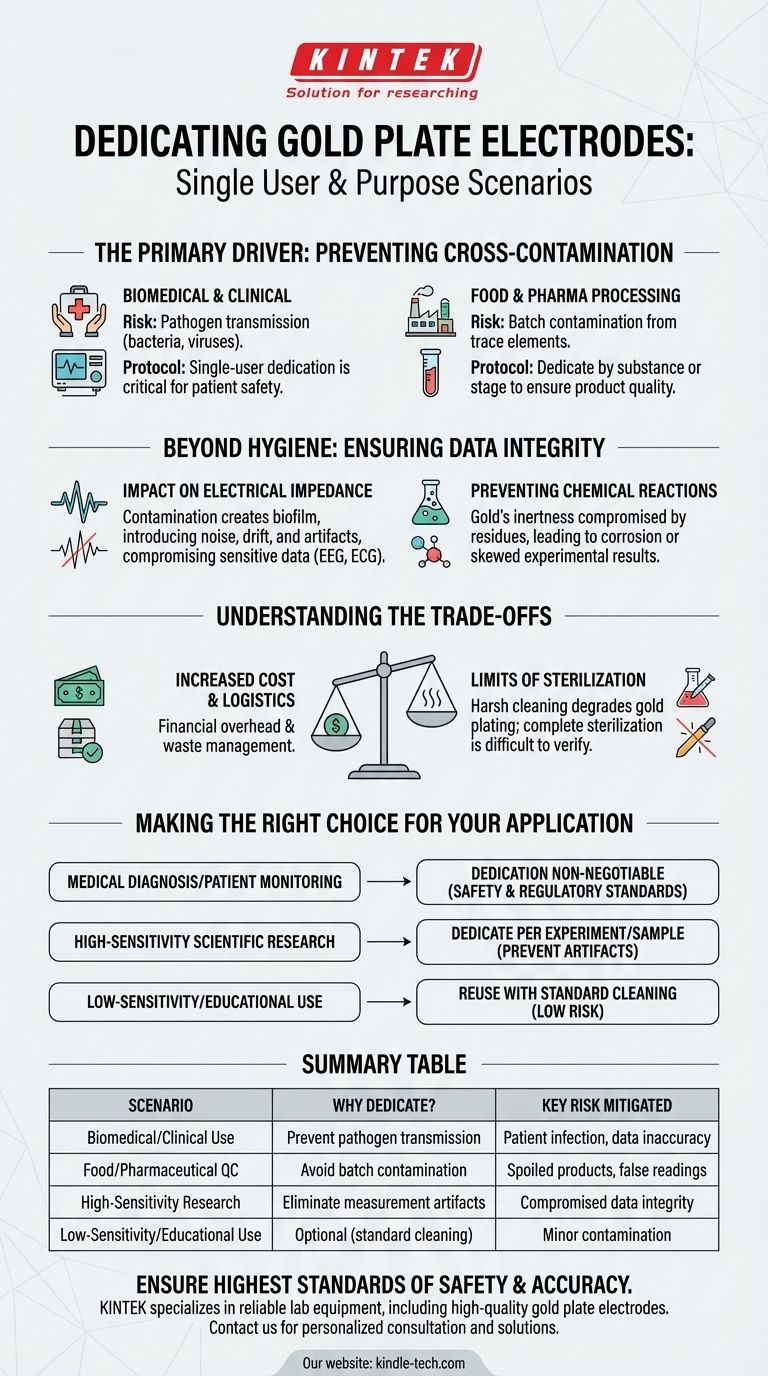
Related Products
- Gold Electrochemical Sheet Electrode Gold Electrode
- Gold Disc Electrode
- Platinum Sheet Electrode for Laboratory and Industrial Applications
- Rotating Platinum Disk Electrode for Electrochemical Applications
- Metal Disc Electrode Electrochemical Electrode
People Also Ask
- What are the key aspects of maintaining and caring for a gold plate electrode? Preserve Performance and Extend Lifespan
- What are gold electrodes used for? Achieve Unmatched Sensitivity in Biosensing and Research
- How should contamination of a gold plate electrode be prevented and managed? Essential Care for Reliable Data
- What precautions should be taken to prevent mechanical damage to a gold plate electrode? Protect Your Data Integrity
- What is the critical rule for using a gold plate electrode? Ensure Only the Gold Surface Contacts the Electrolyte




